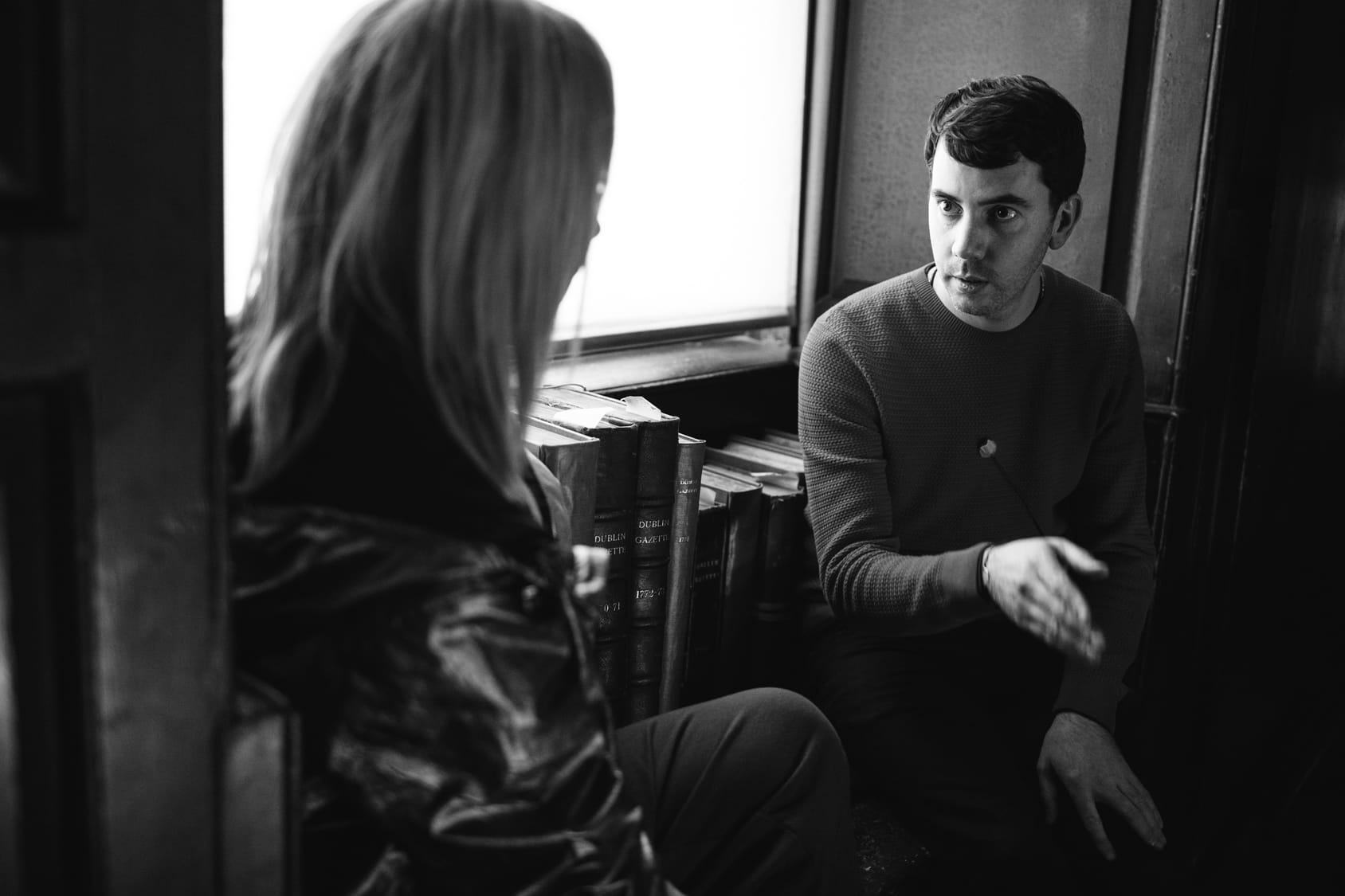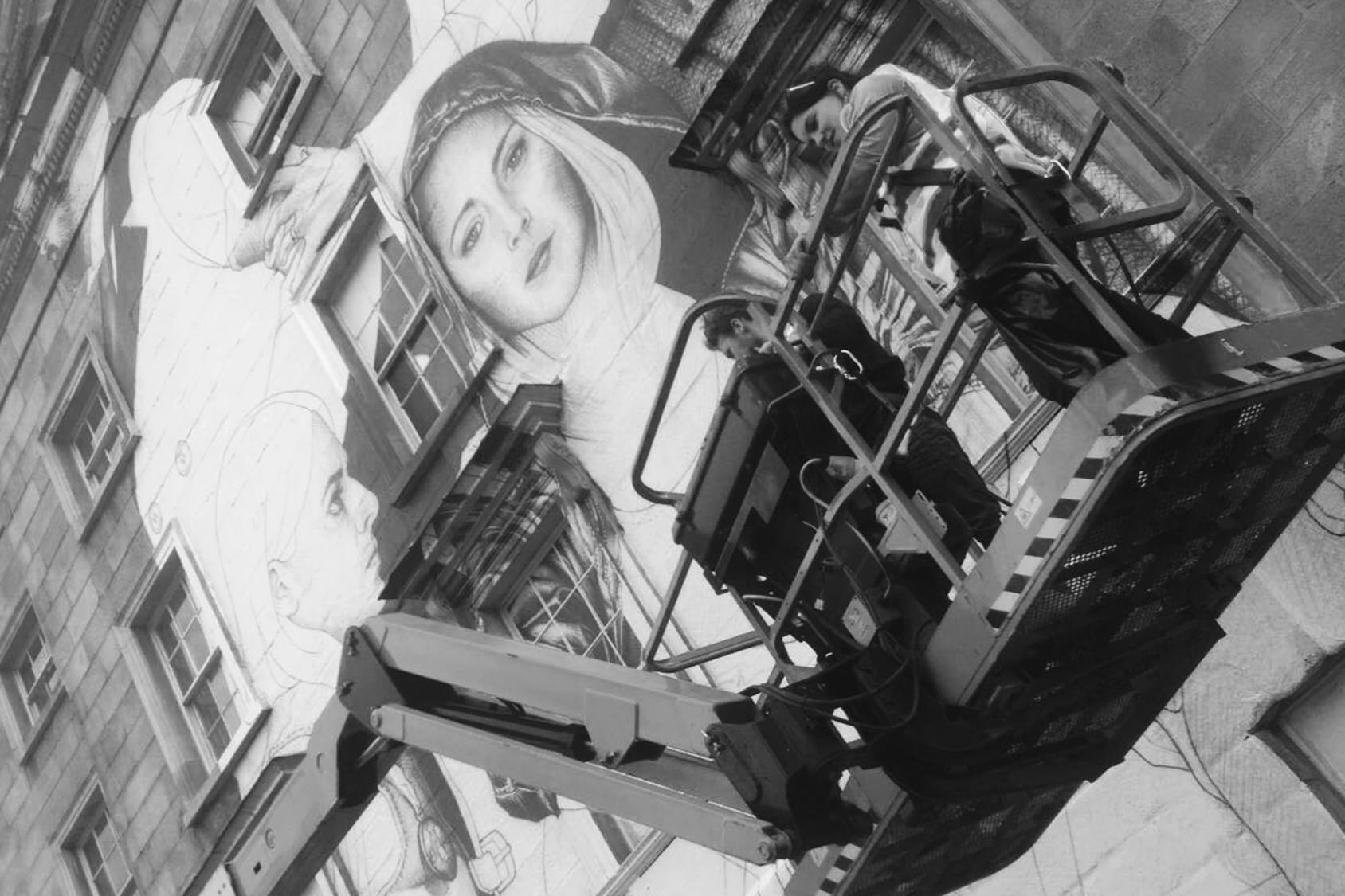Street artist Joe Caslin, known for his large-scale black and white drawings, has released ‘The Volunteers’, a powerful new piece of public art in Front Square of Trinity College. The installation and forthcoming film reflect on Ireland’s century of progress and asks us what battles we must fight in the present. It is the first of a three-part about modern volunteerism and some of Ireland’s most pressing issues: drug addiction, mental health, and direct provision. Read now, in Joe’s own beautiful words, why he chose the theme of drug addiction…
“If you can learn a simple trick, Scout, you’ll get along a lot better with all kinds of folks. You never really understand a person until you consider things from his point of view, until you climb inside of his skin and walk around in it.” – Atticus Finch in ‘To Kill a Mockingbird’ (1962)
From a very young age I had the ability to read and examine a situation through the eyes of each participant. The capability to climb inside someone else’s skin, to see through their eyes and to feel with their heart, felt very natural.
But how did this become manifest? I can’t begin to answer that. Could it be a throwback to the religious laden eighties? Is it a Roscommon super power? Is it a selfish act? Is it a learned behaviour or is it primal? These could all hold some truth. However, I believe my increased emotional intelligence came because I recognised the power of empathy. Empathy moves us to a place of compassion and strength. Through it, I came to realise that my perspective is not the only perspective. I began to draw and embedded empathy in my work.
I am an artist and choose to see the world from inside the skin of many. I am fascinated by people’s lives and I think that the artist’s role is to be observant at all times and to do their best to create and feedback. To hold a mirror up, to advocate and to provoke. I believe the artist has a valued place in society and I believe in the idea of artists as ‘cultivators of empathy’.
The subject of drug addiction is personally poignant. I am not a drug addict. However, addiction courses through my family and friends in various guises. I would consider this to be true of most Irish households. Drug addiction pushes family and friends to breaking point; I have crossed the road with embarrassment, I have hid money well out of sight, I have prayed to all manner of gods and saints, I have cleaned soiled sheets as they sleep unaware, I have shouted and said insufferable things, I have loved unconditionally, I have listened to the lies, I have whatsapped your dealer, I have sat in fear waiting for the phone to ring, I have witnessed your immense talent, I have seen how others look down on you, I have emptied your hiding places, I have laughed in those precious moments we get when the addiction subsides and then hate you for allowing it to return but I have never given up hope.
Drug addiction is complex. It tears family units apart and in turn it decimates communities. We must do more to address the cause of drug addiction and not punish the illness.
Primary health care intervention in Ireland has been secondary to criminal justice procedures when it comes to dealing with drug addiction for the past fifty years. Sixteen successive governments have enforced policies on drug addiction that have yielded incredible misery and a staggering loss of life. Addiction is an illness and should be treated by a health-led approach as opposed to channelling people into the criminal justice system. We can do better. ‘We will be fierce in our compassion and believe.’
The below poem was commissioned for this project and written by poet Erin Fornoff. It was drawn from interviews conducted with Lynn, Rachel and Fiona and hopes to encapsulate the vision and call to arms of the project.
We will let no life be worth less
There is a prologue to each of us.
My history is a drawn line
that stretches behind me endlessly,
and in front of me: unwritten possibility.
The volunteers, mostly their 20s,
from all the various walks, laden
with the burden of centuries:
the tall pillars still hold the scars
of their battles, as they still hold up the roof.
Those elemental arms of survival.
In the face of all of this sorrow,
we offer our work as our proof.
I saw addiction grow in the soil of trauma
a neighborhood inheritance, poverty
and circumstance, a gnawing loneliness:
an ache clawed of holiness
only some howling chemistry lightened.
It was angry and bottomless
and it wrapped like a lover
but then tightened and strangled.
It smothered. And to others,
that fearsome illness turned me criminal.
Here, the ill get shamed
as though their illness is earned,
marched through halls of justice
as though we haven’t learned
that they’re already in a prison
of their own pain.
And treatment is a domain
for another neighborhood.
St. Christopher, the burden-bearer,
did what he could: he crossed the river
carrying a weight heavy as the world.
He said, ‘Go your way in safety.
Go on reassured.’
The ink is stark and black and white –
the words all seem dry at a glance.
But their truth is a chance.
What they mean is a life.
These stones hold the echo
of old explosions, but they hold
the sound of us stacking them too.
We’ll mix mortar with sweat and dust
from the rubble of sorrow.
See what we can do.
There are bombs we can make
with ink and with paper-
a bill, a voice articulated,
a truth plain as a picture on a wall:
they hammer out a proclamation for us all,
and in every cross-hatched line, the message:
Life, in all its walks, is precious.
A country reworked for the better,
a path drawn in line and in letters
a prophecy that’s built of our presence
and made of our time:
a life we can look in the eye as we rise.
We inhale possibility
and exhale it as hope
grateful to the last for the breath as it goes:
our great cause is to cause an effect:
We will let no life be worth less.
We will let no life be worth less.
The new volunteers,
a nation reflected,
its warrior creed:
We will be fierce in our compassion
and believe.
Written by Erin Fornoff
Additional information on THE VOLUNTEERS
The work in Trinity College Dublin looks at the decriminalisation of drug addiction and was installed in concert with the ‘Controlled Drugs and Harm Reduction Bill’ currently before the Houses of the Oireachtas. It showcases three figures integral in drug addiction policy change.
Caslin’s drawing features Fiona O’Reilly, Managing Director of SafetyNet, a primary care service to people who are homeless. “As a society we demonise some form of illness and determine others worthy of treatment. Class determines who we care for and who we criminalise.” said O’Reilly. To Fiona’s left in the drawing is a male figure representing the medical establishment’s lapses in drug abuse intervention.
At the centre of the piece sits Rachel Keogh, an advocate in recovery from heroin addiction. Keogh states, “Joe’s vision twinned with the poem really articulates so well why change needs to happen and my voice couldn’t travel as far as this piece will.” Senator Lynn Ruane, also featured in the installation, sees clear strategies for reform that honour the dignity of every person. Ruane states, “The Controlled Drugs and Harm Reduction Bill introduced by Aodhán Ó Ríordáin and I is intended to tackle the challenges of addiction in a way that truly helps solve it.”
Caslin continued, “The project aims to highlight endemic issues that impact Irish society and her people through the portrayal of emblematic volunteers. This particular drawing has been personally poignant as addiction courses through my family and friends in various guises, like most Irish households.” The project was supported by Trinity Creative Challenge and the Arts Council of Ireland.
Dublin-based Erin Fornoff is an American poet from the Appalachian mountains of North Carolina. She has performed her poetry at dozens of festivals and events including Glastonbury, Electric Picnic, and a national Irish tour with viral poet Hollie McNish. She has featured at Hozier and James Taylor concerts and collaborated with filmmakers and musicians. She was included in Best New English and Irish Poets 2016 and her poems have been commissioned by RTE for national broadcast. Her first collection will be published this autumn by Dedalus Press. Find Erin on Twitter here.
For more information on Joe Caslin’s work go to joecaslin.com
Help Information
- Ana Liffey Drug Project – Freephone 1800 78 68 28 – The Ana Liffey Drug Project is a national addiction service with a ‘Low Threshold – Harm Reduction’ ethos.
- drugs.ie – Drug and alcohol information and support
- CityWide Drugs Crisis Campaign is a national network of community activists and community organisations that are involved in responding to Ireland’s drugs crisis.
You can read Lynn Ruane’s article here, another volunteer as part of Joe Caslin’s Trinity College Dublin installation THE VOLUNTEERS.
You can read Rachel Keogh’s article here, another volunteer as part of Joe Caslin’s Trinity College Dublin installation THE VOLUNTEERS.
Support Our Campaign
We rely on the generosity of the public to fund our work and so far together we have achieved great things! Please do continue to support us so we can provide future generations in Ireland with the resources to recognise and talk about their emotions, and equip them to navigate the ever-changing world around them as they grow






























